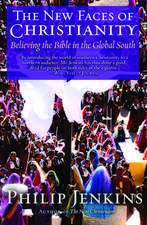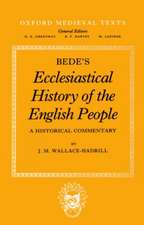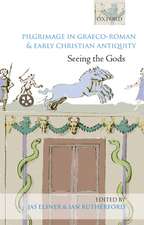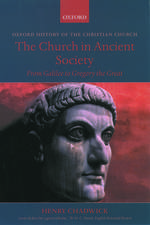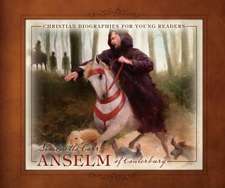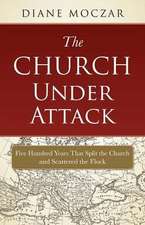John Calvin: Selected Writings
Autor John Calvin Editat de John F. Thornton, Susan B. Varenneen Limba Engleză Paperback – 31 ian 2006
Calvin was a prodigious preacher and writer, and his sermons, Bible commentaries, tracts, and letters fill dozens of volumes. The works chosen for John Calvin: Steward of God’s Covenant highlight ideas central to the Reformation but also to his influence on modern life, e.g., the importance of a work ethic and the notion of being “called” to action in the world; his belief in universal education for boys and girls; and his belief in the sanctity and freedom of individual conscience. Calvin’s theology of the “elect” of God motivated the English and Dutch Calvinists who settled the Atlantic seaboard, their Promised Land. The traditions of their communities and churches and laws produced the widespread present-day American belief in a divinely favored national destiny.
In her brilliant preface to this edition, Pulitzer Prize—winning novelist Marilynne Robinson makes the clearest connection between John Calvin’s own biblical and patristic heritage and the heritage he in turn left the modern world.
| Toate formatele și edițiile | Preț | Express |
|---|---|---|
| Paperback (2) | 131.42 lei 3-5 săpt. | |
| Vintage Books USA – 31 ian 2006 | 131.42 lei 3-5 săpt. | |
| Oxford University Press – 2 ian 1975 | 159.22 lei 32-37 zile |
Preț: 131.42 lei
Nou
Puncte Express: 197
Preț estimativ în valută:
25.15€ • 26.31$ • 20.89£
25.15€ • 26.31$ • 20.89£
Carte disponibilă
Livrare economică 13-27 martie
Preluare comenzi: 021 569.72.76
Specificații
ISBN-13: 9781400096480
ISBN-10: 1400096480
Pagini: 417
Dimensiuni: 134 x 205 x 26 mm
Greutate: 0.33 kg
Editura: Vintage Books USA
ISBN-10: 1400096480
Pagini: 417
Dimensiuni: 134 x 205 x 26 mm
Greutate: 0.33 kg
Editura: Vintage Books USA
Notă biografică
John Calvin, born in 1509 and designated for the Catholic priesthood by his father, became the great French Protestant reformer famous for his doctrine of predestination and his theocratic view of the state. When he died in Geneva in 1564, he left both a city and a world transformed by the impact of his ideas and beliefs.
Marilynne Robinson is the author of the Pulitzer Prize-winning novel, Gilead. Her previous novel, Housekeeping, was nominated for the Pulitzer and has made numerous lists of the best novels of the twentieth century. She is also the author of a collection of essays, The Death of Adam: Essays on Modern Thought, which deals with Calvin's legacy.
John F. Thornton is a literary agent, former book editor, and the coeditor of Dumbing Down: The Strip-Mining of American Culture and Tongues of Angels, Tongues of Men: A Book of Sermons. He lives in New York City.
Susan B. Varenne is a New York City high school teacher with a strong avocational interest in and wide experience of spiritual literature. She holds an M.A. from the University of Chicago Divinity School and a Ph.D. from Columbia University.
Marilynne Robinson is the author of the Pulitzer Prize-winning novel, Gilead. Her previous novel, Housekeeping, was nominated for the Pulitzer and has made numerous lists of the best novels of the twentieth century. She is also the author of a collection of essays, The Death of Adam: Essays on Modern Thought, which deals with Calvin's legacy.
John F. Thornton is a literary agent, former book editor, and the coeditor of Dumbing Down: The Strip-Mining of American Culture and Tongues of Angels, Tongues of Men: A Book of Sermons. He lives in New York City.
Susan B. Varenne is a New York City high school teacher with a strong avocational interest in and wide experience of spiritual literature. She holds an M.A. from the University of Chicago Divinity School and a Ph.D. from Columbia University.
Extras
THE NECESSITY OF REFORMING THE CHURCH
A Humble Exhortation to the most invincible Emperor Charles V and the most illustrious Princes and other Orders, now holding a Diet of the Empire at Spires that they seriously undertake the task of restoring the Church presented in the name of all those who wish Christ to reign
By Dr. John Calvin
August Emperor,
This Diet is summoned by you in order at last to deliberate and decide, along with the Most Illustrious Princes and other Orders of the Empire, upon the means of ameliorating the present condition of the Church, which we all see to be very miserable and almost desperate. Now, therefore, while you sit for this consultation, I humbly beg and implore, first of your Imperial Majesty, and at the same time of you also, Most Illustrious Princes and distinguished gentlemen, that you will not decline to read and diligently consider what I have to lay before you. The magnitude and weight of the cause may well incite you to an eagerness to listen. I shall set the matter so plainly in front of you that you can have no difficulty in determining what part you must play. Whoever I am, I here profess to plead in defense both of sound doctrine and of the Church. In this character I seem at all events entitled to expect that you will not deny me audience, until such time as it may appear whether I falsely usurp the character, or whether I faithfully perform its duties and make good what I profess. But though I feel that I am by no means equal to so great a task, yet I am not at all afraid that, after you have heard the nature of my office, I shall be accused either of folly or presumption in having ventured thus to bring this matter before you. There are two things by which men are wont to recommend, or at least to justify, their conduct. If a thing is done honestly and from pious zeal, we deem it worthy of praise; if it is done under the pressure of public necessity, we at least deem it not unworthy of excuse. Since both of these apply here, I am confident, such is your equity, that I shall easily approve my design in your eyes. For where can I exert myself to better purpose or more honestly, where, too, in a matter at this time more necessary, than in attempting, according to my ability, to aid the Church of Christ, whose claims it is lawful in no instance to deny, and which is now in grievous distress and in extreme danger? But there is no occasion for a long preface concerning myself. Receive what I say as if it were the united voice of all who either have already taken care to restore the Church or desire that it should be restored to true order. On my side are several exalted Princes and not a few distinguished communities. For all these I speak though an individual, so that it is more truly they who at the same time and with one mouth speak through me. To these add the countless multitude of pious men, scattered over the various regions of the Christian world, who yet unanimously concur with me in this pleading. In short, regard this as the common address of all who so earnestly deplore the present corruption of the Church that they are unable to bear it any longer and are determined not to rest till they see some amendment. I know with what odious names we are marked down for disgrace; but meanwhile, whatever be the name by which it is thought proper to call us, hear our cause, and after that judge what place we are entitled to hold.
First, then, the question is not whether the Church suffers from many and grievous diseases, for this is admitted even by all moderate judges; but whether the diseases are of a kind whose cure admits of no longer delay, so that it is neither useful nor proper to wait upon too slow remedies. We are accused of rash and impious innovation, for having ventured to propose any change at all in the former state of the Church. What? Even if it has been done with good cause and not imperfectly? I hear there are persons who, even in this case, do not hesitate to condemn us; they think us right indeed in desiring amendment, but not right in attempting it. From them, all I would ask at present is that for a little they suspend judgment until I shall have shown from the facts that we have not been prematurely hasty, have attempted nothing rashly, nothing alien to our duty, and have in short done nothing until compelled by the highest necessity. To enable me to prove this, it is necessary to attend to the matters in dispute.
We maintain to start with that when God raised up Luther and others who held forth a torch to light us into the way of salvation and on whose ministry our churches are founded and built, those heads of doctrine in which the truth of our religion, those in which the pure and legitimate worship of God, and those in which the salvation of men are comprehended, were in a great measure obsolete. We maintain that the use of the sacraments was in many ways vitiated and polluted. And we maintain that the government of the Church was converted into a species of horrible and insufferable tyranny. But perhaps these statements have not force enough to move certain individuals until they are better explained. This, therefore, I will do, not as the subject demands, but as far as my ability will permit. Here, however, I have no intention to review and discuss all our controversies; that would require a long discourse, and this is not the place for it. I wish only to demonstrate how just and necessary the causes were which forced us to the changes for which we are blamed.
To accomplish this, I must show that the particular remedies which the Reformers employed were apt and salutary; not here intending to describe the manner in which we proceeded (for this will afterward be seen), but only to make it manifest that we have had no other end in view than to ameliorate in some degree the very miserable condition of the Church. Our doctrine has been, and is every day, assailed by many cruel calumnies. Some declaim loudly against it in sermons; others attack and ridicule it in their writings. Both rake together everything by which they hope to bring it into disrepute among the ignorant. But there is in men’s hands the Confession of our Faith, which we presented to your Imperial Majesty. It clearly testifies how undeservedly we are harassed by so many odious accusations. We have always been ready in times past, as we are at the present day, to render an account of our doctrine. In a word, there is no doctrine preached in our churches but that which we openly profess. As to contested points, they are clearly and honestly explained in our Confession, while everything relating to them has been copiously treated and diligently expounded by our writers. Hence judges who are not unjust must be satisfied how far we are from every kind of impiety. This much certainly must be clear alike to just and unjust, that the Reformers have done no small service to the Church in stirring up the world as from the deep darkness of ignorance to read the Scriptures, in laboring diligently to make them better understood, and in happily throwing light on certain points of doctrine of the highest practical importance. In sermons little else used to be heard than old wives’ fables and fictions equally frivolous. The schools resounded with brawling questions, but Scripture was seldom mentioned. Those who held the government of the Church had this one concern, to prevent any diminution of their gains. Accordingly, they readily tolerated whatever brought grist to their mill. Even the most prejudiced admit that our people have in some degree reformed these evils, however much they may impugn our doctrine at other points.
But I do not wish that all the profit the Church has derived from our labor should avail to mitigate our fault, if in any other respect we have injured her. Therefore let there be an examination of our whole doctrine, of our form of administering the sacraments, and our method of governing the Church; and in none of these three things will it be found that we have made any change in the old form, without attempting to restore it to the exact standard of the Word of God.
All our controversies concerning doctrine relate either to the legitimate worship of God or to the ground of salvation. As to the former, certainly we exhort men to worship God in neither a frigid nor a careless manner; and while we point out the way, we neither lose sight of the end, nor omit anything which is relevant to the matter. We proclaim the glory of God in terms far loftier than it was wont to be proclaimed before, and we earnestly labor to make the perfections in which his glory shines better and better known. His benefits toward ourselves we extol as eloquently as we can. Thus men are incited to reverence his majesty, render due homage to his greatness, feel due gratitude for his mercies, and unite in showing forth his praise. In this way there is infused into their hearts that solid confidence which afterward gives birth to prayer. In this way too each one is trained to genuine self-denial, so that his will being brought into obedience to God, he bids farewell to his own desires. In short, as God requires us to worship him in a spiritual manner, so we with all zeal urge men to all the spiritual sacrifices which he commends.
Even our enemies cannot deny our assiduity in these exhortations, that men look for the good which they desire from none but God, that they confide in his power, trust in his goodness, depend on his truth, and turn to him with the whole heart, rest on him with full hope, and resort to him in necessity, that is, at every moment, and ascribe to him every good thing enjoyed, and testify to this by expressions of praise. That none may be deterred by difficulty of access, we proclaim that a fountain of all blessings is offered us in Christ, from which we may draw everything needful. Our writings are witnesses, and our sermons also, how frequent and sedulous we are in recommending true repentance, urging men to renounce their reason, their carnal desires, and themselves entirely, that they may be brought into obedience to God alone, and live no longer to themselves but to him. Nor indeed do we overlook external duties and works of charity, which follow on such renewal. This, I say, is the sure and unerring form of divine worship, which we know that he approves, because it is the form which his Word prescribes. These are the only sacrifices of the Christian Church which have attestation from him.
Since, therefore, in our churches, God alone is adored in pure form without superstition, since his goodness, wisdom, power, truth, and other perfections are there preached more fully than anywhere else, since he is invoked with true faith in the name of Christ, his mercies celebrated with both heart and tongue, and men constantly urged to a simple and sincere obedience; since in short nothing is heard but what tends to promote the sanctification of his name, what cause have those who call themselves Christians to take us up so ill? First, since they love darkness rather than light, they cannot tolerate the sharpness with which we, as in duty bound, rebuke the gross idolatry which is apparent everywhere in the world. When God is worshipped in images, when fictitious worship is instituted in his name, when supplication is made to the images of saints, and divine honors paid to dead men’s bones and other similar things, we call them abominations as they are. For this cause, those who hate our doctrine inveigh against us and represent us as heretics who dare to abolish the worship of God as approved of old by the Church. Concerning this name of Church, which they are ever and anon holding up before them as a kind of shield, we will shortly speak. Meanwhile how perverse, when these infamous corruptions are manifest, not only to defend them, but to dissemble and represent them as the genuine worship of God!
Both sides confess that in the sight of God idolatry is an execrable crime. But when we attack the worship of images, our adversaries immediately take the opposite side and lend support to the crime which they had with us verbally condemned. Indeed, as is more ridiculous, while they agree with us as to the term in Greek, it is no sooner turned into Latin than their opposition begins. For they strenuously defend the veneration of images, though they condemn idolatry. But these ingenious men deny that the honor which they pay to images is worship, as if, when compared with ancient idolatry, it were possible to see any difference. Idolaters pretended that they worshipped the celestial gods, though under corporeal figures which represented them. What else do our adversaries pretend? But is God satisfied with such excuses? Did the prophets on this account cease to rebuke the madness of the Egyptians, when, out of the secret mysteries of their theology, they drew subtle distinctions under which to screen themselves? What too do we suppose the brazen serpent which the Jews worshipped to have been, but something which they honored as a representation of God? “The Gentiles,” says Ambrose (in Ps. 118), “worship wood, because they think it an image of God, whereas the invisible image of God is not in that which is seen, but precisely in that which is not seen.” But what is done today? Do they not prostrate themselves before images, as if God were present in them? Unless they supposed the power and grace of God to be attached to pictures and statues, would they flee to them when they desired to pray?
A Humble Exhortation to the most invincible Emperor Charles V and the most illustrious Princes and other Orders, now holding a Diet of the Empire at Spires that they seriously undertake the task of restoring the Church presented in the name of all those who wish Christ to reign
By Dr. John Calvin
August Emperor,
This Diet is summoned by you in order at last to deliberate and decide, along with the Most Illustrious Princes and other Orders of the Empire, upon the means of ameliorating the present condition of the Church, which we all see to be very miserable and almost desperate. Now, therefore, while you sit for this consultation, I humbly beg and implore, first of your Imperial Majesty, and at the same time of you also, Most Illustrious Princes and distinguished gentlemen, that you will not decline to read and diligently consider what I have to lay before you. The magnitude and weight of the cause may well incite you to an eagerness to listen. I shall set the matter so plainly in front of you that you can have no difficulty in determining what part you must play. Whoever I am, I here profess to plead in defense both of sound doctrine and of the Church. In this character I seem at all events entitled to expect that you will not deny me audience, until such time as it may appear whether I falsely usurp the character, or whether I faithfully perform its duties and make good what I profess. But though I feel that I am by no means equal to so great a task, yet I am not at all afraid that, after you have heard the nature of my office, I shall be accused either of folly or presumption in having ventured thus to bring this matter before you. There are two things by which men are wont to recommend, or at least to justify, their conduct. If a thing is done honestly and from pious zeal, we deem it worthy of praise; if it is done under the pressure of public necessity, we at least deem it not unworthy of excuse. Since both of these apply here, I am confident, such is your equity, that I shall easily approve my design in your eyes. For where can I exert myself to better purpose or more honestly, where, too, in a matter at this time more necessary, than in attempting, according to my ability, to aid the Church of Christ, whose claims it is lawful in no instance to deny, and which is now in grievous distress and in extreme danger? But there is no occasion for a long preface concerning myself. Receive what I say as if it were the united voice of all who either have already taken care to restore the Church or desire that it should be restored to true order. On my side are several exalted Princes and not a few distinguished communities. For all these I speak though an individual, so that it is more truly they who at the same time and with one mouth speak through me. To these add the countless multitude of pious men, scattered over the various regions of the Christian world, who yet unanimously concur with me in this pleading. In short, regard this as the common address of all who so earnestly deplore the present corruption of the Church that they are unable to bear it any longer and are determined not to rest till they see some amendment. I know with what odious names we are marked down for disgrace; but meanwhile, whatever be the name by which it is thought proper to call us, hear our cause, and after that judge what place we are entitled to hold.
First, then, the question is not whether the Church suffers from many and grievous diseases, for this is admitted even by all moderate judges; but whether the diseases are of a kind whose cure admits of no longer delay, so that it is neither useful nor proper to wait upon too slow remedies. We are accused of rash and impious innovation, for having ventured to propose any change at all in the former state of the Church. What? Even if it has been done with good cause and not imperfectly? I hear there are persons who, even in this case, do not hesitate to condemn us; they think us right indeed in desiring amendment, but not right in attempting it. From them, all I would ask at present is that for a little they suspend judgment until I shall have shown from the facts that we have not been prematurely hasty, have attempted nothing rashly, nothing alien to our duty, and have in short done nothing until compelled by the highest necessity. To enable me to prove this, it is necessary to attend to the matters in dispute.
We maintain to start with that when God raised up Luther and others who held forth a torch to light us into the way of salvation and on whose ministry our churches are founded and built, those heads of doctrine in which the truth of our religion, those in which the pure and legitimate worship of God, and those in which the salvation of men are comprehended, were in a great measure obsolete. We maintain that the use of the sacraments was in many ways vitiated and polluted. And we maintain that the government of the Church was converted into a species of horrible and insufferable tyranny. But perhaps these statements have not force enough to move certain individuals until they are better explained. This, therefore, I will do, not as the subject demands, but as far as my ability will permit. Here, however, I have no intention to review and discuss all our controversies; that would require a long discourse, and this is not the place for it. I wish only to demonstrate how just and necessary the causes were which forced us to the changes for which we are blamed.
To accomplish this, I must show that the particular remedies which the Reformers employed were apt and salutary; not here intending to describe the manner in which we proceeded (for this will afterward be seen), but only to make it manifest that we have had no other end in view than to ameliorate in some degree the very miserable condition of the Church. Our doctrine has been, and is every day, assailed by many cruel calumnies. Some declaim loudly against it in sermons; others attack and ridicule it in their writings. Both rake together everything by which they hope to bring it into disrepute among the ignorant. But there is in men’s hands the Confession of our Faith, which we presented to your Imperial Majesty. It clearly testifies how undeservedly we are harassed by so many odious accusations. We have always been ready in times past, as we are at the present day, to render an account of our doctrine. In a word, there is no doctrine preached in our churches but that which we openly profess. As to contested points, they are clearly and honestly explained in our Confession, while everything relating to them has been copiously treated and diligently expounded by our writers. Hence judges who are not unjust must be satisfied how far we are from every kind of impiety. This much certainly must be clear alike to just and unjust, that the Reformers have done no small service to the Church in stirring up the world as from the deep darkness of ignorance to read the Scriptures, in laboring diligently to make them better understood, and in happily throwing light on certain points of doctrine of the highest practical importance. In sermons little else used to be heard than old wives’ fables and fictions equally frivolous. The schools resounded with brawling questions, but Scripture was seldom mentioned. Those who held the government of the Church had this one concern, to prevent any diminution of their gains. Accordingly, they readily tolerated whatever brought grist to their mill. Even the most prejudiced admit that our people have in some degree reformed these evils, however much they may impugn our doctrine at other points.
But I do not wish that all the profit the Church has derived from our labor should avail to mitigate our fault, if in any other respect we have injured her. Therefore let there be an examination of our whole doctrine, of our form of administering the sacraments, and our method of governing the Church; and in none of these three things will it be found that we have made any change in the old form, without attempting to restore it to the exact standard of the Word of God.
All our controversies concerning doctrine relate either to the legitimate worship of God or to the ground of salvation. As to the former, certainly we exhort men to worship God in neither a frigid nor a careless manner; and while we point out the way, we neither lose sight of the end, nor omit anything which is relevant to the matter. We proclaim the glory of God in terms far loftier than it was wont to be proclaimed before, and we earnestly labor to make the perfections in which his glory shines better and better known. His benefits toward ourselves we extol as eloquently as we can. Thus men are incited to reverence his majesty, render due homage to his greatness, feel due gratitude for his mercies, and unite in showing forth his praise. In this way there is infused into their hearts that solid confidence which afterward gives birth to prayer. In this way too each one is trained to genuine self-denial, so that his will being brought into obedience to God, he bids farewell to his own desires. In short, as God requires us to worship him in a spiritual manner, so we with all zeal urge men to all the spiritual sacrifices which he commends.
Even our enemies cannot deny our assiduity in these exhortations, that men look for the good which they desire from none but God, that they confide in his power, trust in his goodness, depend on his truth, and turn to him with the whole heart, rest on him with full hope, and resort to him in necessity, that is, at every moment, and ascribe to him every good thing enjoyed, and testify to this by expressions of praise. That none may be deterred by difficulty of access, we proclaim that a fountain of all blessings is offered us in Christ, from which we may draw everything needful. Our writings are witnesses, and our sermons also, how frequent and sedulous we are in recommending true repentance, urging men to renounce their reason, their carnal desires, and themselves entirely, that they may be brought into obedience to God alone, and live no longer to themselves but to him. Nor indeed do we overlook external duties and works of charity, which follow on such renewal. This, I say, is the sure and unerring form of divine worship, which we know that he approves, because it is the form which his Word prescribes. These are the only sacrifices of the Christian Church which have attestation from him.
Since, therefore, in our churches, God alone is adored in pure form without superstition, since his goodness, wisdom, power, truth, and other perfections are there preached more fully than anywhere else, since he is invoked with true faith in the name of Christ, his mercies celebrated with both heart and tongue, and men constantly urged to a simple and sincere obedience; since in short nothing is heard but what tends to promote the sanctification of his name, what cause have those who call themselves Christians to take us up so ill? First, since they love darkness rather than light, they cannot tolerate the sharpness with which we, as in duty bound, rebuke the gross idolatry which is apparent everywhere in the world. When God is worshipped in images, when fictitious worship is instituted in his name, when supplication is made to the images of saints, and divine honors paid to dead men’s bones and other similar things, we call them abominations as they are. For this cause, those who hate our doctrine inveigh against us and represent us as heretics who dare to abolish the worship of God as approved of old by the Church. Concerning this name of Church, which they are ever and anon holding up before them as a kind of shield, we will shortly speak. Meanwhile how perverse, when these infamous corruptions are manifest, not only to defend them, but to dissemble and represent them as the genuine worship of God!
Both sides confess that in the sight of God idolatry is an execrable crime. But when we attack the worship of images, our adversaries immediately take the opposite side and lend support to the crime which they had with us verbally condemned. Indeed, as is more ridiculous, while they agree with us as to the term in Greek, it is no sooner turned into Latin than their opposition begins. For they strenuously defend the veneration of images, though they condemn idolatry. But these ingenious men deny that the honor which they pay to images is worship, as if, when compared with ancient idolatry, it were possible to see any difference. Idolaters pretended that they worshipped the celestial gods, though under corporeal figures which represented them. What else do our adversaries pretend? But is God satisfied with such excuses? Did the prophets on this account cease to rebuke the madness of the Egyptians, when, out of the secret mysteries of their theology, they drew subtle distinctions under which to screen themselves? What too do we suppose the brazen serpent which the Jews worshipped to have been, but something which they honored as a representation of God? “The Gentiles,” says Ambrose (in Ps. 118), “worship wood, because they think it an image of God, whereas the invisible image of God is not in that which is seen, but precisely in that which is not seen.” But what is done today? Do they not prostrate themselves before images, as if God were present in them? Unless they supposed the power and grace of God to be attached to pictures and statues, would they flee to them when they desired to pray?
Cuprins
ABOUT THE VINTAGE SPIRITUAL CLASSICS
by John F. Thornton and Susan B. Varenne, General Editors
PREFACE TO THE VINTAGE SPIRITUAL CLASSICS
EDITION by Marilynne Robinson
CHRONOLOGY OF THE LIFE OF JOHN CALVIN
A NOTE ON THE TEXTS
From THE NECESSITY OF REFORMING THE CHURCH (1543)
From THE INSTITUTES OF THE CHRISTIAN RELIGION
Of the Knowledge of God the Creator (Book 1, Chapters 1–5)
The Life of a Christian (Book 3, Chapters 6–10)
Of Prayer (Book 3, Chapter 20)
COMMENTARY ON SCRIPTURE
The Old Testament
—The Author’s Preface to the Commentary on the Psalms
—Psalm 16
—Psalm 23
—Psalm 51
—Psalm 90
—Isaiah 55:1–13
The New Testament
—Matthew 5:1–12 / Luke 6:20–26 (The Beatitudes)
—Matthew 7:1–5 / Mark 4:24 / Luke 6:37–42 (Judge not . . .”)
—Matthew 8:5–13 / Luke 7:1–10 (The Cure of the Centurion’s Servant)
—Luke 7:36–50 (The Woman Who Was a Sinner)
—Matthew 27:45–56 / Mark 15:33–41 / Luke 23:44–49 (The Crucifixion)
—Matthew 28:1–7 / Mark 16:1–7 / Luke 24:1–8 (The Women at the Tomb of Jesus)
—John 14:15–18 (“If you love me, keep my commandments.”)
—Romans 1:16–17 (God’s Righteousness)
—James 2:14–26 (Faith and Good Works)
SELECTED PRAYERS AND SERMONS
Prayers
Sermon on the Fourth Commandment (Deuteronomy 5:13–15)
Sermon on the Fifth Commandment (Deuteronomy 5:16)
The Lord Answers Job (Job 38:1–4)
When Curse Becomes Blessing (Galatians 3:13–18)
Sermon on the Doctrine of Election (2 Timothy 1:9, 10)
THE DEATH OF JOHN CALVIN
SUGGESTIONS FOR FURTHER READING
by John F. Thornton and Susan B. Varenne, General Editors
PREFACE TO THE VINTAGE SPIRITUAL CLASSICS
EDITION by Marilynne Robinson
CHRONOLOGY OF THE LIFE OF JOHN CALVIN
A NOTE ON THE TEXTS
From THE NECESSITY OF REFORMING THE CHURCH (1543)
From THE INSTITUTES OF THE CHRISTIAN RELIGION
Of the Knowledge of God the Creator (Book 1, Chapters 1–5)
The Life of a Christian (Book 3, Chapters 6–10)
Of Prayer (Book 3, Chapter 20)
COMMENTARY ON SCRIPTURE
The Old Testament
—The Author’s Preface to the Commentary on the Psalms
—Psalm 16
—Psalm 23
—Psalm 51
—Psalm 90
—Isaiah 55:1–13
The New Testament
—Matthew 5:1–12 / Luke 6:20–26 (The Beatitudes)
—Matthew 7:1–5 / Mark 4:24 / Luke 6:37–42 (Judge not . . .”)
—Matthew 8:5–13 / Luke 7:1–10 (The Cure of the Centurion’s Servant)
—Luke 7:36–50 (The Woman Who Was a Sinner)
—Matthew 27:45–56 / Mark 15:33–41 / Luke 23:44–49 (The Crucifixion)
—Matthew 28:1–7 / Mark 16:1–7 / Luke 24:1–8 (The Women at the Tomb of Jesus)
—John 14:15–18 (“If you love me, keep my commandments.”)
—Romans 1:16–17 (God’s Righteousness)
—James 2:14–26 (Faith and Good Works)
SELECTED PRAYERS AND SERMONS
Prayers
Sermon on the Fourth Commandment (Deuteronomy 5:13–15)
Sermon on the Fifth Commandment (Deuteronomy 5:16)
The Lord Answers Job (Job 38:1–4)
When Curse Becomes Blessing (Galatians 3:13–18)
Sermon on the Doctrine of Election (2 Timothy 1:9, 10)
THE DEATH OF JOHN CALVIN
SUGGESTIONS FOR FURTHER READING
Descriere
Descriere de la o altă ediție sau format:
This volume presents texts selected from the full range of John Calvin's writings, including excerpts from commentaries, sermons, letters, catechisms, tracts, broad-based theological works.
This volume presents texts selected from the full range of John Calvin's writings, including excerpts from commentaries, sermons, letters, catechisms, tracts, broad-based theological works.

